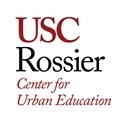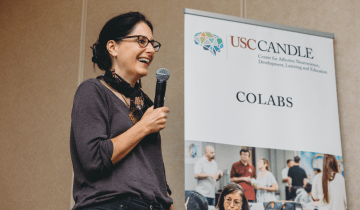
The Center for Urban Education (CUE) at the USC’s Rossier School of Education and the Western Interstate Commission for Higher Education (WICHE) are partnering on a project supporting the implementation of Colorado’s bold higher education reform agenda. With funding from the Ford Foundation and the Bill & Melinda Gates Foundation, CUE and WICHE will work with three postsecondary institutions in Colorado—the University of Colorado Denver, Metropolitan State University of Denver, and the Community College of Aurora—as well as with the Colorado Department of Higher Education (CDHE) and the Colorado Community College System to align the state’s higher education policy measures with concrete, equity-focused measures.
Equity in Excellence, a two-year, $1 million project funded equally by the Ford Foundation and Bill & Melinda Gates Foundation, is building on work already underway in Colorado. Over the past two years, the Colorado Commission on Higher Education and other education and political leaders have created a new strategic plan and legislation aimed at increasing the number of Coloradans aged 25 to 34 who hold high-quality degrees and certificates. Equity in Excellence will assist the state’s public colleges and universities in translating the goals outlined in the plan and legislation into concrete action at the campus level.
Colorado, which is projected to see the share of its minority high school graduates (and potential college students) increase from 30 percent of the total to 36 percent in the next four years, is an excellent place to road-test equity initiatives. For Colorado to meet President Obama’s postsecondary attainment goals, the state will have to boost its college graduation numbers dramatically: from 308,000 in 2010 to at least 445,000 in 2020, according to the U.S. Department of Education.
CUE and WICHE, who partnered on a previous equity-focused project in Nevada, will help Colorado leaders identify goals related to equity gaps in targeted academic milestones, such as retention, success in STEM (science, technology, engineering, and math) courses, and transfer or degree completion. Working with the three metro Denver institutions, they will conduct a policy audit and analysis, looking at equity-focused policies and practices related to students’ academic progress and success. They will also support faculty, staff, and administrators at the three institutions as they identify specific goals, benchmarks to measure progress, and action plans that outline concrete steps for reaching those targets. And they will work, in partnership with CDHE, to integrate these campus-level action plans and benchmarks into Colorado’s ongoing policy reforms, in order to strengthen the state’s policy strategies, particularly with respect to closing postsecondary attainment gaps.
“A focus on equity in access and in success must accompany the completion agenda that currently dominates the national higher education discourse,” said Estela Mara Bensimon, CUE’s co-director. “Meeting ambitious statewide completion goals will require on-the-ground ownership of equity and excellence as institutional and system-wide goals, as a matter of policy and of practice.”
“Closing the postsecondary education gap has become more critical than ever, as our student population has become more diverse,” said David Longanecker, president of WICHE. And if action isn’t taken, that gap will only grow bigger. According to WICHE’s just-published Knocking at the College Door: Projections of High School Graduates, by 2019-20 nearly half of the nation’s public high school graduates are projected to be minorities. “To succeed in our fiercely competitive global economy, we need all hands on deck. It’s critical that all our young men and women receive the benefit of a higher education and put it into play, in their careers and their communities. We also need to create a postsecondary environment that allows our older adults who didn’t finish college to return and earn their degrees.”
Beyond these economic realities, increased educational success for racial/ethnic groups is also a matter of civic health and social justice. Equity in educational outcomes means greater opportunity for individuals and families from all of Colorado’s diverse communities.
The Equity in Excellence Advisory Board, which met in Boulder, CO, last week, includes representatives from the CDHE and the postsecondary institutions involved in the project, as well as foundation, nonprofit, and business members. Board members include: Geri Anderson, vice president and provost, Colorado Community College System; Greg Anderson, dean, Morgridge College of Education, University of Denver; Linda Bowman, lecturer, Higher Education Program, Morgridge College of Education, University of Denver; Don Elliman, chancellor, University of Colorado Denver; Matt Gianneschi, deputy executive director, Colorado Department of Higher Education; Vicki L. Golich, provost and vice president for academic and student affairs, Metropolitan State University of Denver; Stephen Jordan, president, Metropolitan State University of Denver; Janet Lopez, program officer, Rose Community Foundation; Nancy McCallin, president, Colorado Community College System; Olivia Mendoza, executive director, Colorado Latino Forum; Rico Munn, partner, Baker and Hostetler; Roderick Nairn, vice chancellor, University of Colorado Denver; and Alton Scales, president, Community College of Aurora.
About CUE & WICHE
The Center for Urban Education, established at the University of Southern California in 1999 as part of the university’s urban initiative, leads socially conscious research and develops tools needed for institutions of higher education to produce equity in student outcomes.
The Western Interstate Commission for Higher Education and its 16 members work collaboratively to expand educational access and excellence for all citizens of the West. Members include 15 Western states (Alaska, Arizona, California, Colorado, Hawai‘i, Idaho, Montana, Nevada, New Mexico, North Dakota, Oregon, South Dakota, Utah, Washington, and Wyoming) and the Pacific island U.S. territories and free-standing states (the Commonwealth of the Northern Mariana Islands is the first to participate). By promoting innovation, cooperation, resource sharing, and sound public policy among states and institutions, WICHE strengthens higher education’s contributions to the region’s social, economic, and civic life.
Contacts
- Emily Ogle, CUE communication and production manager: 213.740.2799, eogle@usc.edu
- Lee Ann Cornell, CUE project manager: 213.740.0304, lcornell@usc.edu
- Demarée Michelau, WICHE director of policy analysis: dmichelau@wiche.edu, 303.541.0223
- Annie Finnigan, WICHE communications manager: afinnigan@wiche.edu, 303.541.0273
Established at the University of Southern California in 1999 as part of the University’s urban initiative, the Center for Urban Education (CUE) leads socially conscious research and develops tools needed for institutions of higher education to produce equity in student outcomes.



